Learn how to edit a resume with expert tips, easy step-by-step advice, and ATS-friendly templates to help you stand out.


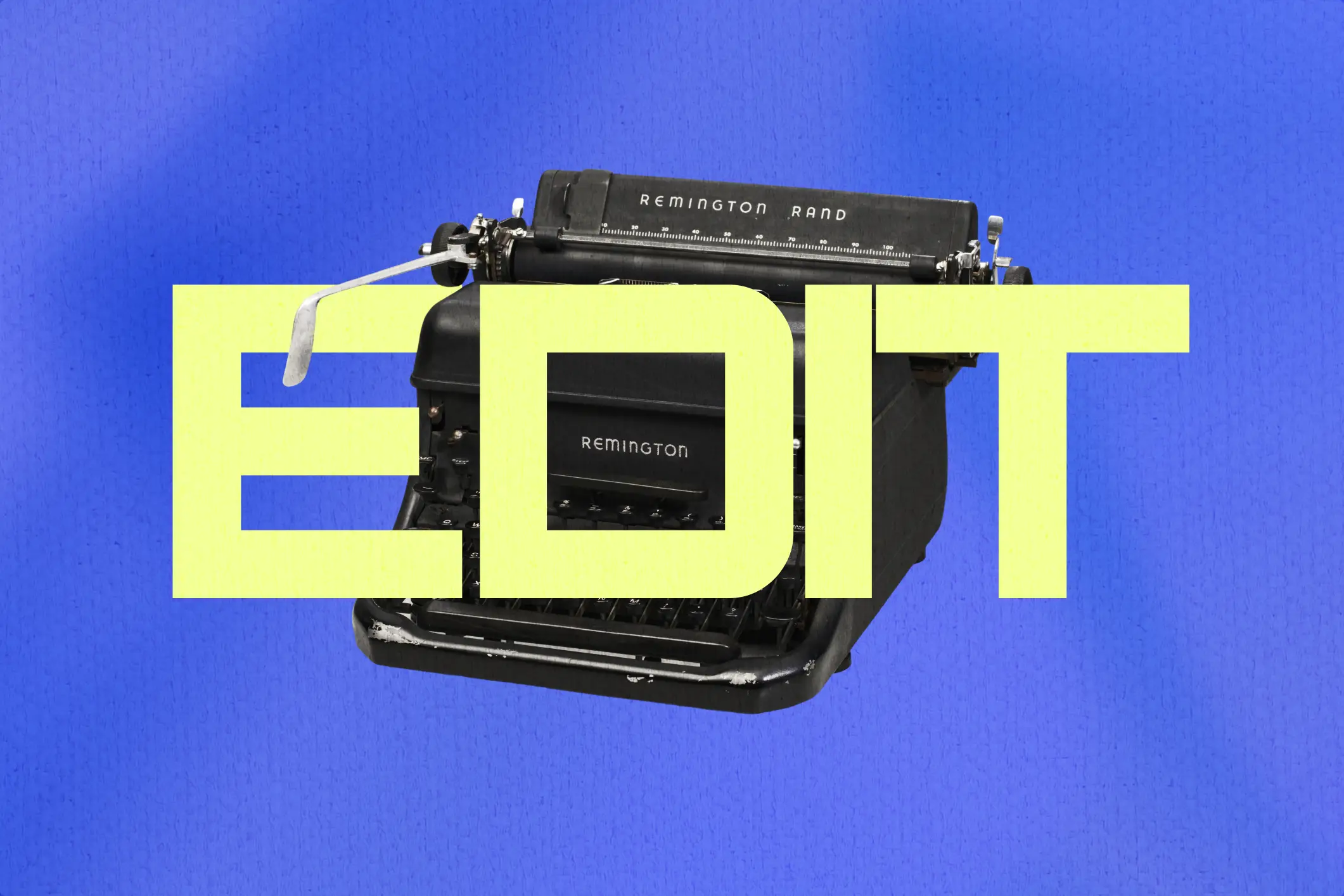
Editing your resume is about showcasing your skills, qualifications, and experience in the best possible light. Always keep your professional story accurate, relevant, and ready for what comes next. Regular edits help you capture new achievements before you forget them, adjust your skills to match industry expectations, and refine your formatting. It also gives you a chance to highlight accomplishments and remove anything that no longer reflects your career goals. Keeping your resume updated means you’re never starting from scratch; you’re simply maintaining a clear, confident record of who you are as a candidate whenever opportunities appear.
Editing a resume is one of those tasks everyone avoids until suddenly you need to send it tomorrow.
I’ve seen and reviewed numerous resumes, and one thing has become clear: people don’t always need a completely new resume. They just need to edit the one they already have.
Not a full rewrite. Not an entire overhaul. Just a clean, thoughtful edit that tightens the writing, removes the fluff, and makes your skills impossible to miss. Breaking the resume-editing process into smaller steps has saved my sanity.
In this guide, I’ll walk you through what to remove, what to add, and how to strengthen each section.
Here’s what we’ll cover:
- How to edit your resume step-by-step.
- Ways to use a resume builder to refine your resume.
- My top resume template picks for inspiration.
And check out more guides for refining your resume:
- How to Update Your Resume
- Resume Mistakes to Avoid
- Why You Should Never Lie on a Resume
- Why Is It Hard to Write a Good Resume?
- Improve An Entry-Level Resume with Rezi
Keen to get started? Try our free AI Resume Builder. You can start from scratch or upload your existing resume to make edits as we guide you through expert suggestions and feedback.
Why Should You Edit Your Resume?
Here’s why it’s important to edit your resume:
- Ensure you clearly represent your achievements, responsibilities, and core areas of expertise in the best possible light.
- Check that your resume is aligned with best hiring practices, formatting trends, and applicant tracking systems (ATS).
- Make applying for new opportunities faster and less stressful.
- Keep your work history, skills, and qualifications current, so nothing gets overlooked.
- Showcase your growth over time and build more confidence as you track your progress.
We build our resumes once, breathe a sigh of relief, and then let them collect digital dust for years.
The problem is, when you finally need to edit it, the process feels way more stressful than it should. You’re trying to make sense of what’s already there, tighten the writing, and represent your experience in a clearer way. It’s easy to get overwhelmed when you realize parts of your resume could be sharper, stronger, or more focused.
That’s why regularly adding your wins, new skills, and milestones makes the whole thing so much easier on your future self.
Giving your resume a periodic refresh also helps you stay in line with what employers expect, so you’re always prepared, relevant, and ready when a new opportunity comes along.
How to Edit a Resume
Here’s how to edit a resume:
- Simplify your resume format and ensure your application is ATS-friendly by removing distracting design features, tables, and photos.
- Add keywords from the job description to tailor your resume and show employers you match their requirements.
- Emphasize relevant details and cut the filler, such as outdated information or vague buzzwords that don’t add real value to your resume.
- Include action verbs and specific language to highlight your achievements and give hiring managers a better idea of what you can bring to the company.
- Check for grammatical errors and typos before sending to prove your attention to detail and professionalism.
Let’s explore further how to edit and update your resume to impress employers.
1. Simplify your resume format and design
Your resume has all the right skills and achievements, but you’re still not getting any replies. Even with all the glowing qualifications, none of it matters if your resume is messy or difficult to read.
An organized, simple resume layout helps both hiring managers and applicant tracking systems (ATS) quickly understand your information.
You don’t need fancy graphics or design elements; it only distracts from your content and makes you look unprofessional. Simplicity makes your resume easier to skim and less likely to confuse the ATS. Your goal is to make the reader’s job as easy as possible.
Here’s how to edit your formatting:
- Use consistent fonts and section headers with plenty of white space, so the eye can move naturally from line to line.
- Stick to ATS-friendly formatting: clear section titles like “Work History” or “Skills”. You don’t need tables, columns, and please, no vague skills charts.
- Choose a readable resume font (Arial, Verdana, Calibri) in the 10–12 point range, and keep margins close to one inch with single or 1.15 spacing.
- Remove any photo or headshot. This isn’t a dating app; images only add bias risk and distract from your qualifications.
Make sure your resume format is compatible with resume scanners
A lot of resumes are edited in Microsoft Word or Google Docs, and that’s completely fine. You can still land interviews with a resume made in either. The only thing to keep in mind is that traditional document editors weren't built with modern applicant tracking systems (ATS) in mind, which can often lead to formatting inconsistencies.
In our Resume Metadata Standard project, we reviewed how different builders handle formatting and structure. Our templates at Rezi scored the highest for ATS compatibility, but the main takeaway is this: choose a format that’s clean, consistent, and easy for scanners to interpret.
If you’d rather not manage spacing, headers, and formatting yourself, you can import your content into one of our ATS resume templates so you can focus entirely on improving the writing.
Learn more:
- What Does a Resume Look Like?
- MS Word Resume Templates
- Free Canva Resume Templates
- Free Google Docs Resume Templates
- Best Adobe Illustrator Resume Templates
2. Add keywords from the job description
Many applicants send the same generic resume to dozens of roles and hope something sticks (spoiler: it rarely does). Sprinkling in resume keywords from the job posting helps you mirror the language employers use and ensures you’re connecting directly to what they need.
Yes, tailoring your resume to each job sounds like effort, but it dramatically increases your chances of getting noticed because it aligns your skills with the company’s priorities. Recruiters know what to scan for, so make it easy for them to check off those boxes.
Here’s how to tailor your application:
- Pull up job postings in your field, compare their required skills to your resume, and add any relevant keywords you’re already qualified for but haven’t mentioned.
- Create multiple versions of your resume to match the roles you’re pursuing rather than relying on a single one-size-fits-all document.
- Read each job description carefully, then revisit your resume to make sure you’ve included the duties, tools, or skills that genuinely reflect your experience.
- Take it further by including details in your resume and cover letter that reflect the company’s mission and culture.
Take a look at this advice from a career coach on tailoring your resume:
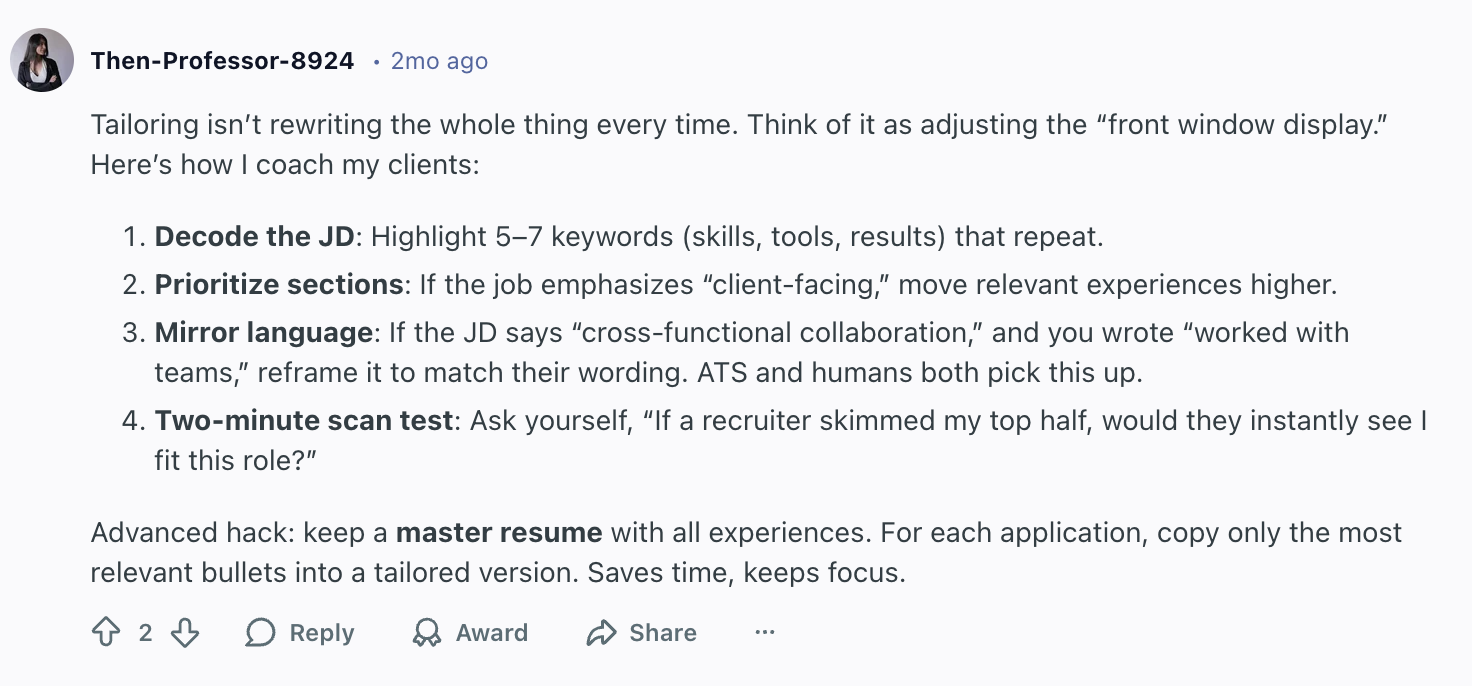
Check out our AI Keyword Targeting tool to identify and weave in important terms and phrases from the job description. Simply copy and paste the job description, and then you’ll immediately find the keywords missing that you could include, as shown below:
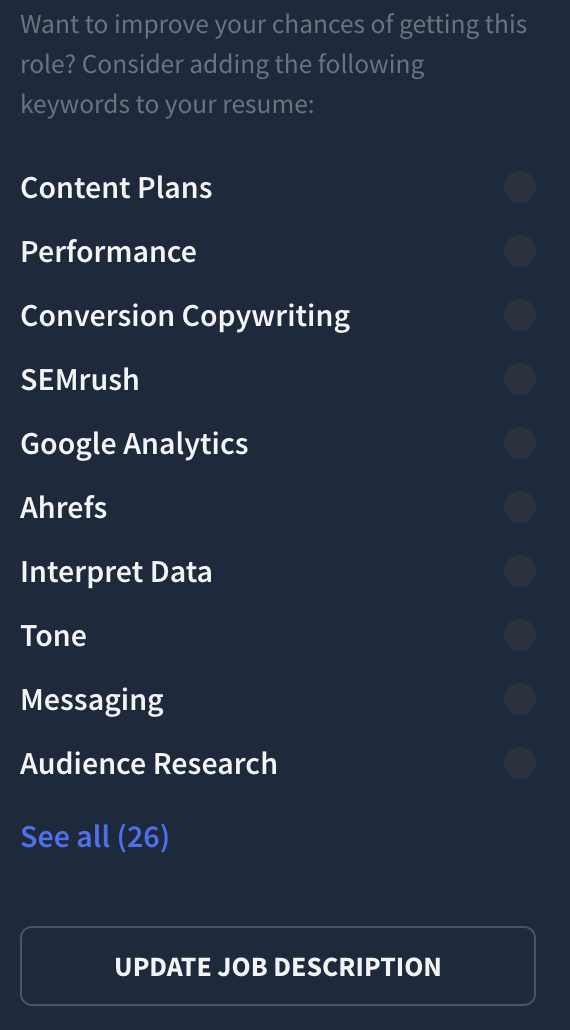
3. Emphasize relevant details and cut the filler
Editing your resume isn’t just about adding new information; you also have to cut what no longer serves you.
A hiring manager isn’t looking for your entire life story — your stint as a tarot card reader might be a cool “fun fact”, but it won’t guarantee you a future at the company. Employers want professional highlights that relate to their role.
Relevance is everything. Whether you’re shifting industries or updating a long-ignored resume, focus on details that position you as a strong match while removing anything that distracts from that narrative.
Here’s how to identify what’s relevant on your resume:
- Ensure every job entry includes the essentials: job title, company, location, dates, and accomplishment-driven bullet points.
- Review older or outdated experiences and adjust them based on the skills required for your current career goals or new industry direction.
- Add meaningful sections (if you have room), such as summaries, certifications, volunteer roles, or internships, but only when they strengthen your relevance.
- Tighten your writing by removing overdone buzzwords, complex jargon, varying sentence structure, and eliminating fluff that doesn’t add value.
- Keep your resume to a single page unless you have 20+ years of experience.
Here’s some useful advice on Reddit if you’re debating whether to remove entire jobs:
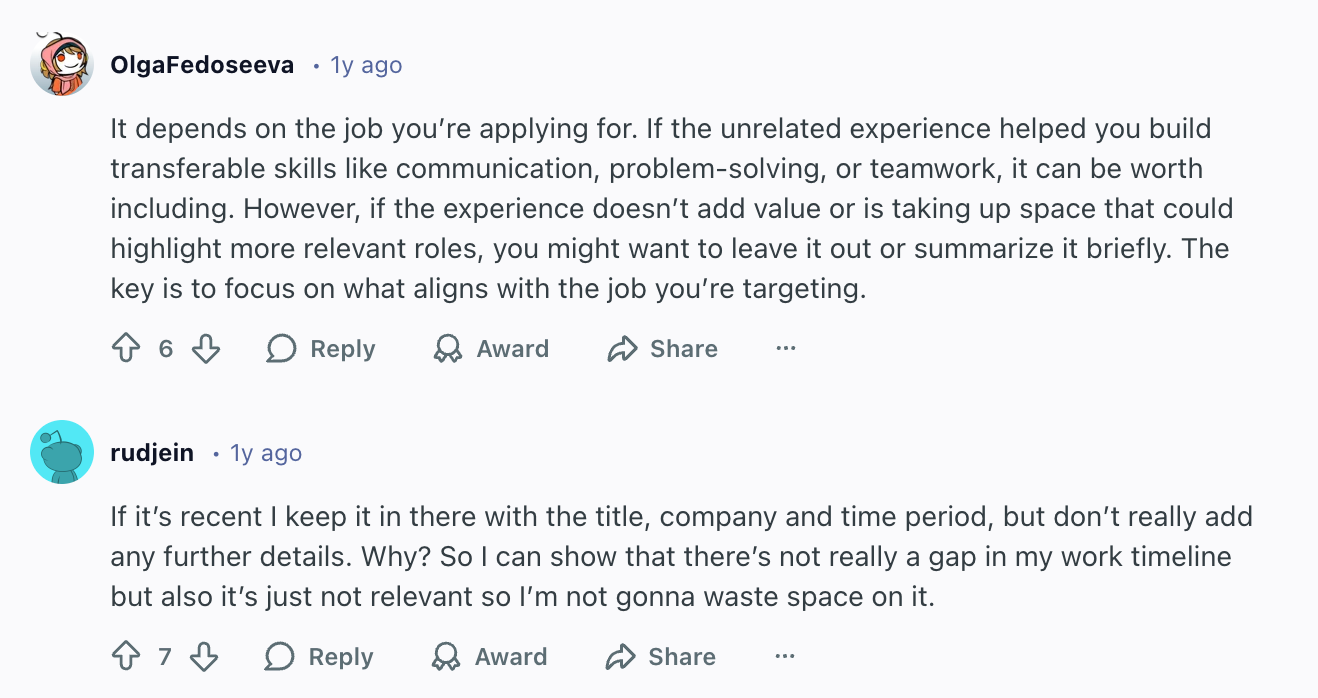
4. Include action verbs and specific language
Most of us are guilty of using generic buzzwords when we’re drawing blanks, even when they don’t actually reveal much. You claim you’re a team player? Does that mean you work well in group projects, or that you’re just the main instigator for after-work drinks?
Instead of calling yourself a “great problem-solver” or “strong communicator,” show what you’ve done. Action verbs add more impact and instantly shift your bullets from job duties to resume achievements. Instead of saying you communicate well, explain how you “negotiated a budget-saving deal with stakeholders”.
Here’s how to create more impact:
- Replace vague descriptors and buzzwords with dynamic action verbs that focus on what you actually accomplished.
- Choose specific, high-impact verbs like “optimized,” “launched,” “automated,” or “engineered” when they accurately describe your work.
- Pair those verbs with quantifiable results, such as percentages, volume metrics, time saved, or user impact.
- Use action-driven language to shift the focus from basic job duties to measurable achievements.
Try our AI Bullet Point Editor to make your resume bullet points more impactful. All you need to do is highlight your existing points and get rewriting suggestions based on the best resume practices. Here’s what that looks like:

5. Check for grammatical errors and typos
As a writer, I understand that reading through your entire document after already spending hours on it isn’t the most enjoyable way to spend your time. But even the strongest resume can be undermined by a simple typo. Errors instantly chip away at your credibility because they suggest a lack of attention to detail.
Proofreading is part of presenting yourself professionally. Tools like Grammarly and ProWritingAid can help, but your own eyes (and ears!) are still the most reliable editors. And if your brain is numb from all the editing, you can even ask a trusted friend to take a quick look.
Here’s how to review your application before sending:
- Triple-check your contact details; one wrong letter in your email or digit in your phone number can cost you interviews.
- Use grammar-checking tools to catch common mistakes, but don’t rely on them alone. They can sometimes miss things or make your content less authentic to you.
- Look out for typos, awkward phrasing, and inconsistencies that weaken your overall message.
- Read your resume out loud to spot clunky sentences, missing words, and places where your writing doesn’t flow.
Need some expert resume help? Our Rezi Resume Review feature puts you in touch with one of our professionals to get personalized feedback and tips.
How to Use a Resume Builder to Edit Your Resume
Here’s a breakdown of how to use a resume builder to edit a resume:
- Choose a professional resume template, highlighting your experience and ensuring ATS compatibility.
- Tailor your resume summary or objective to the job description to make a strong first impression on employers.
- Focus on achievements in your work experience to demonstrate real impact.
- Emphasize in-demand skills in your industry to improve recruiter attention and ATS ranking.
- Refine your education section to keep it accurate and relevant as your career progresses.
- Get feedback and apply changes to optimize your resume before sending it out.
Now, let’s see how you can use Rezi’s features to improve your job application.
1. Choose a professional resume template
When you’re updating a resume with a builder, your first big move is picking a template that supports your story — not just one that looks nice.
Don’t get tempted by all those fun design features and bold colors. A good builder should provide layouts that already follow best practices, so you’re not stuck worrying about spacing, alignment, or inconsistent formatting.
Your template should match your experience level, industry, and the personality of the role you’re aiming for. Start with a structure that sets you up for clarity, professionalism, and ATS-friendliness before you type a single word.
Here’s a breakdown of Rezi’s ATS-friendly templates:
- We’ve designed Rezi’s templates to pass ATS filters. That means no funky text boxes, clutter, or weird formatting that gets scrambled in parsing systems.
- You’ll find templates tailored to different fields, such as traditional industries like finance or law, and creative spaces like design or marketing.
- Reverse-chronological layouts come ready-made inside Rezi, perfect for most job seekers, because they highlight career growth at a glance.
- If you’re new to the workforce, you can tweak the layout to emphasize skills, education, and internships without making the page feel sparse.
Find out more: How to Pick the Right Resume Template
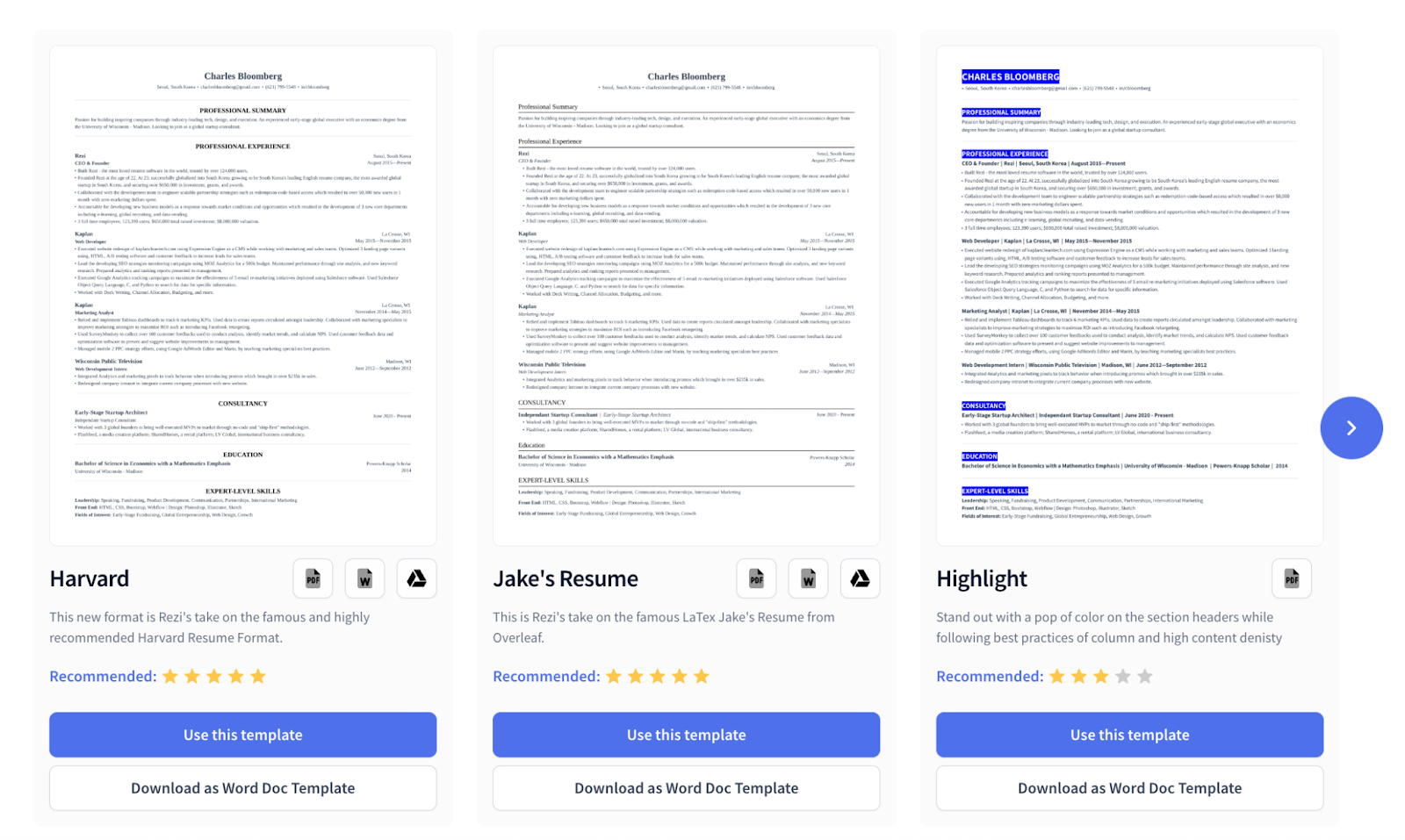
2. Tailor your resume summary or objective
Those first few lines on your resume can be intimidating; it’s that all-important first impression, and you somehow have to include all your best professional bits in just a few lines.
And yes, you’ll need to update this as you grow in your career.
Your resume summary gives employers a quick idea of who you are, what you’re great at, and what direction you’re heading. A strong summary pulls from your biggest wins, your core skills, and the value you can bring to a team. You should include keywords and target the specific role.
Here’s how an AI Summary Writer can help:
- Simply enter the role you’re applying for, the skills you want to highlight, and the job description, so the tool can deliver you a customized resume summary.
- “AI Writer Ready” generates a professional version right away, but you can regenerate alternatives or adjust the wording until it sounds good to you.
- Our tool automatically weaves in relevant keywords so your summary aligns with industry expectations and ATS requirements.

3. Focus on achievements in your work experience
When you edit your resume using a builder, the work experience section is where you should focus most of your attention. If your bullet points read more like a job description, that’s simply not enough. You need to prove what you actually accomplished and how it made a difference.
Builders help by structuring this section into clear resume bullet points, so employers get an idea of how you can contribute to the company. While you’re making edits, it’s also the perfect time to double-check promotions, add missing roles, and update outdated responsibilities.
Here’s how to use an AI Bullet Point Writer to improve your work experience:
- Rezi’s AI Bullet Point Writer creates professional work-experience bullets for you, either standard achievement-based points or quantified versions that highlight real metrics.
- If a bullet still feels meh, you can run it through the AI Bullet Editor and choose from rewritten options that sharpen your wording and incorporate industry-relevant language.
- Quantified bullets (“increased sales by 18%,” “served 200+ clients monthly,” etc.) are especially powerful, and Rezi helps you phrase them with clarity and relevance.
- The tool also keeps your bullets concise, focused, and consistent, so each one makes an impact without rambling.

4. Emphasize in-demand skills in your industry
Your resume skills section is the perfect place to add those all-important keywords and get the seal of approval when recruiters are in skim-mode. They also help improve your chances with ATS systems when they’re scanning for specific keywords and phrases.
But how do you know which skills they’re looking for?
A resume builder helps you identify the most in-demand skills based on your industry and the job description. Hard skills deserve the spotlight here because they’re the easiest for employers to verify and the most relevant for ATS systems. Soft skills matter too, but are best shown through your examples in your work history.
Here’s how to use the AI Skills Explorer to track down relevant skills:
- Rezi’s AI Skills Explorer lets you enter your current skill set and uncover additional skills commonly required in your industry.
- The tool identifies in-demand, role-relevant skills so you can update your resume with confidence instead of guessing what employers want.
- You can choose between Hard Skills, Soft Skills, Technical Skills, and Languages to create a nice balance and cover all corners.
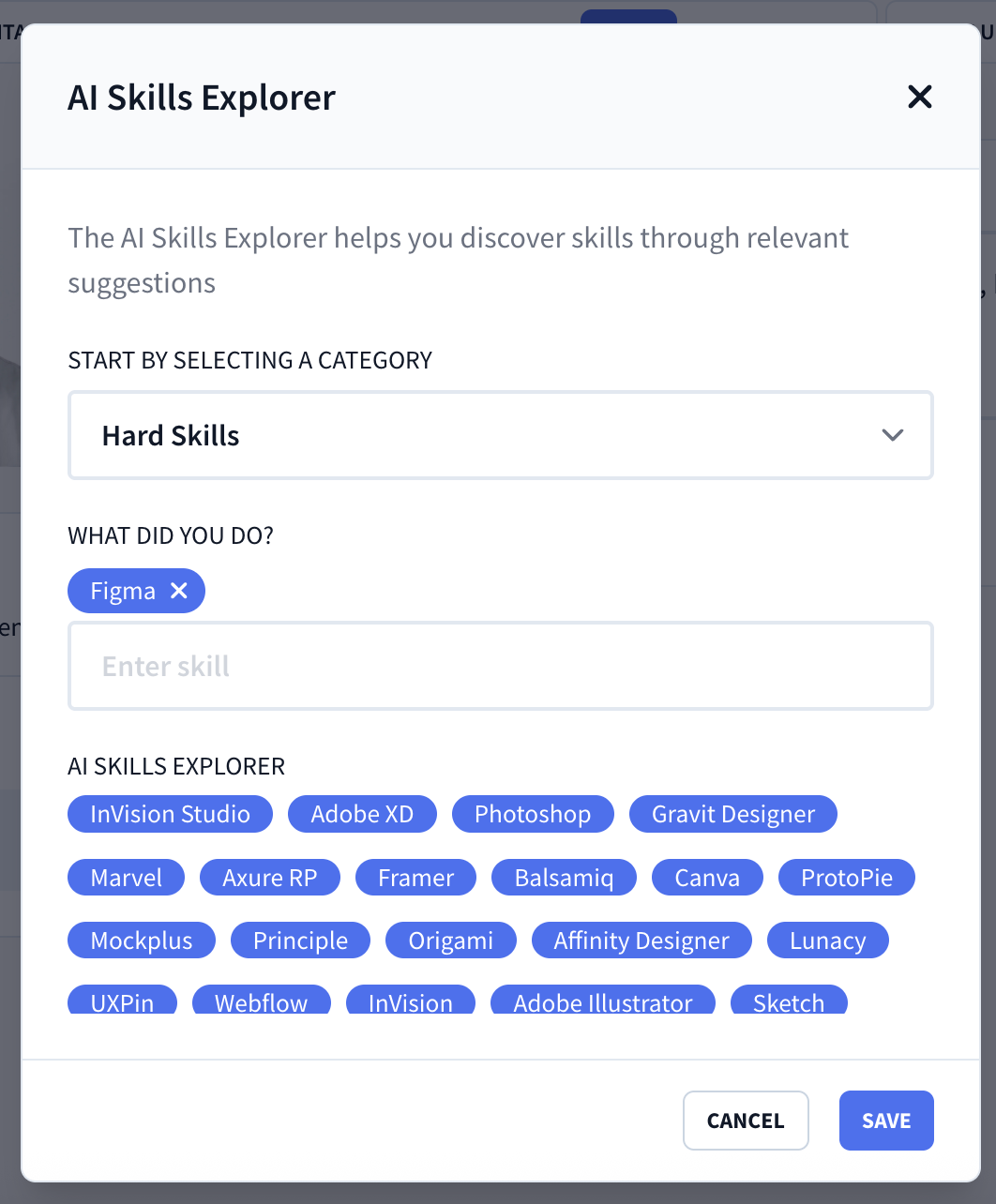
Explore more popular skills for every industry:
- AI Skills for Your Resume
- Best Technical Skills for a Resume
- How to List Resume Language Skills?
- High-Income Skills to Make More Money
5. Refine your education section
Your education section is pretty straightforward, and it’s easy to overlook when making edits. But as your career progresses, it could be the section taking up the most valuable space. It could also be the place to add extra details if you’re fresh out of college.
Using a resume builder to update your education section ensures you’re not forgetting anything important or including things that no longer belong. Resume builders prompt you to add relevant courses, certifications, or workshops since you last updated your resume. They also let you easily remove older or irrelevant details once you’ve gained enough experience.
Here’s how Rezi guides you through the edits:
- Rezi’s tab-based layout walks you through each required part of a resume, including education, so nothing gets overlooked.
- You can quickly add sections for certifications, coursework, or academic projects if they support your current career goals.
- The tabs and fields also make it easier to cut outdated information, like high school details that don’t add value once you have a degree or years of experience.
- The clear formatting keeps your education readable, so employers can instantly verify credentials without digging.
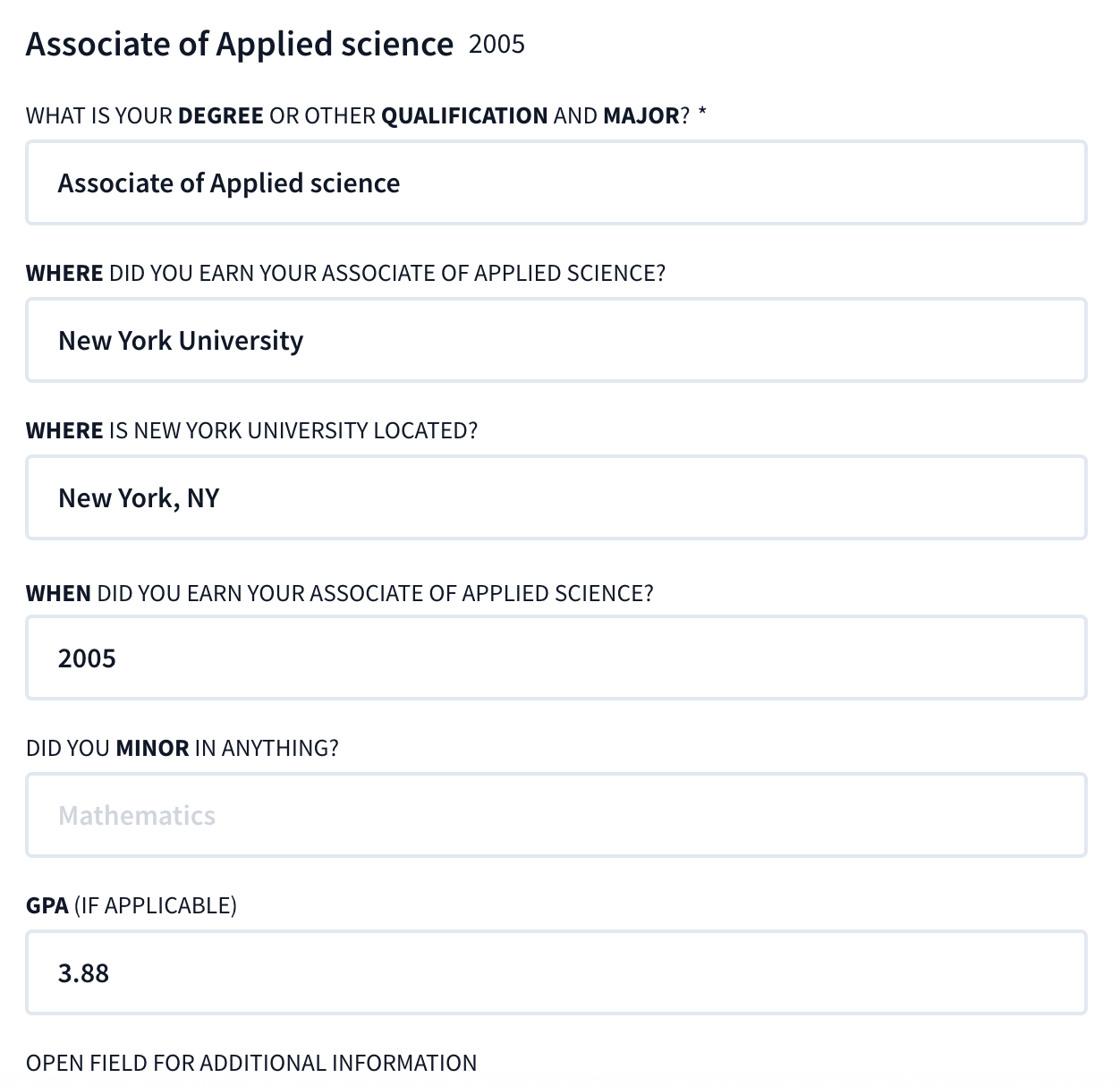
6. Get feedback and apply changes
Most of us have had the absolute displeasure of sending out dozens of applications and hearing nothing back. No feedback or explanation, just silence. It leaves you wondering if you’re the problem, or if you just need to make tweaks to your resume (let’s go with the latter).
One of the biggest advantages of using a resume builder is instant feedback. Instead of debating whether your resume “looks good,” you can rely on real-time guidance that evaluates your content, formatting, and keyword optimization. This kind of feedback helps you catch small mistakes, improve clarity, and stay aligned with what hiring managers expect.
Here’s how the Rezi Score makes it easier to edit:
- The Rezi Score grades your resume from 1 to 100 to give you a better idea of how job-ready your document is.
- Behind that score are five categories: Content, Format, Optimization, Best Practices, and Application Ready — each covering 20+ audits.
- Because Rezi Score is connected to Real-Time Analysis, your score updates instantly as you tweak bullet points, edit sections, or fix formatting.
- The Real-Time Content Analysis spots issues like weak phrasing, missing metrics, filler words, and inconsistent punctuation.
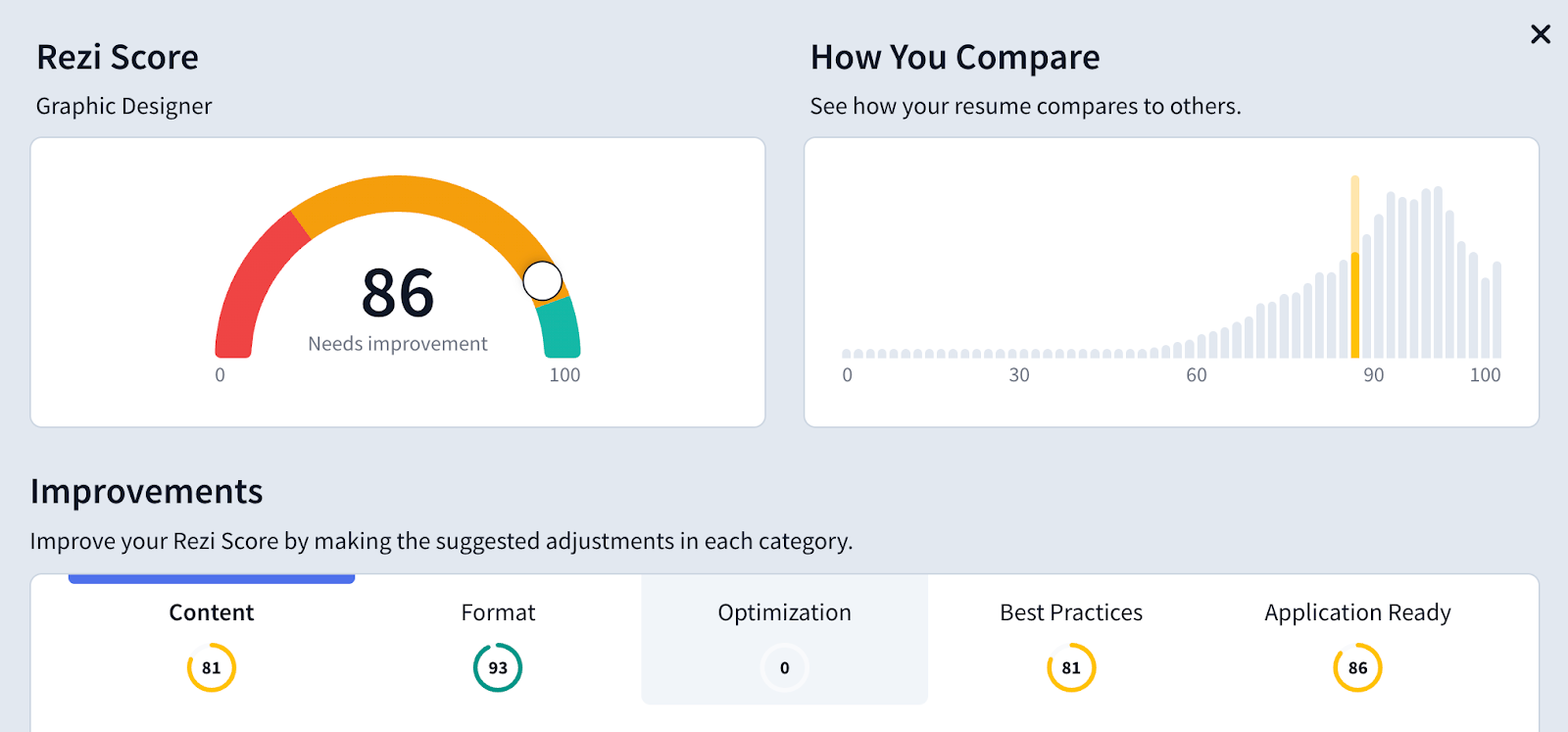
Explore the top resume builders for updating your application: Best AI Resume Builders
7. Improve your resume with AI Resume Agent
Most of us are familiar with ChatGPT. While it can be helpful, it’s not always the most accurate source of information. And when a job is on the line, using it to edit your resume could even be risky. All it takes is the wrong prompt or a simple misunderstanding to get a badly edited job application.
That’s why we created the AI Resume Agent. Rezi AI Agent works similarly to ChatGPT, except it’s trained specifically for resume best practices, expert career advice, and proven job search strategies. It can offer personalized suggestions, rewrite entire sections, tailor your bullet points, and much more.
Here’s how the AI Resume Agent works:
- You’ll find the Rezi AI Resume Agent by clicking its icon in the sidebar and either choosing a guided option or entering your own prompt.
- You can select options like Improve My Rezi Score, Target My Resume, or Find Jobs to start a conversation and receive tailored feedback.
- Ask follow-up questions or enter custom prompts to get personalized advice on resumes, job search, and career development.
- Upload your resume for analysis, paste a job description to tailor your resume, or request bullet point ideas to better showcase your experience.
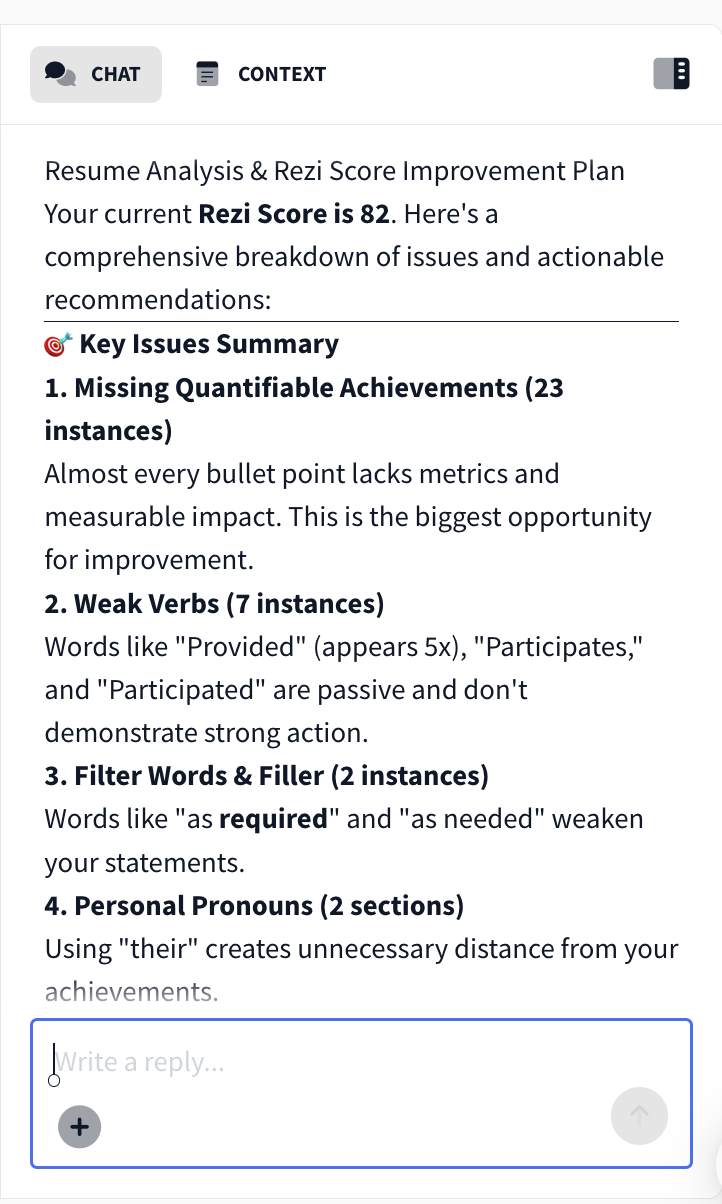
Best Resume Templates and Examples
Want to see what the end result should look like after you’ve made your edits? I’ve included five different templates with different designs and structures depending on the vibe you’re going for. That said, they are all professional, ATS-friendly, and ready to download so you can start updating your resume.
ATS-Friendly Resume Template
Our ATS-friendly resume delivers exactly what it says on the tin. We’ve focused on simplicity and professionalism over bold design elements and mismatched colors. This template ensures the focus stays on your content and won’t confuse ATS systems.
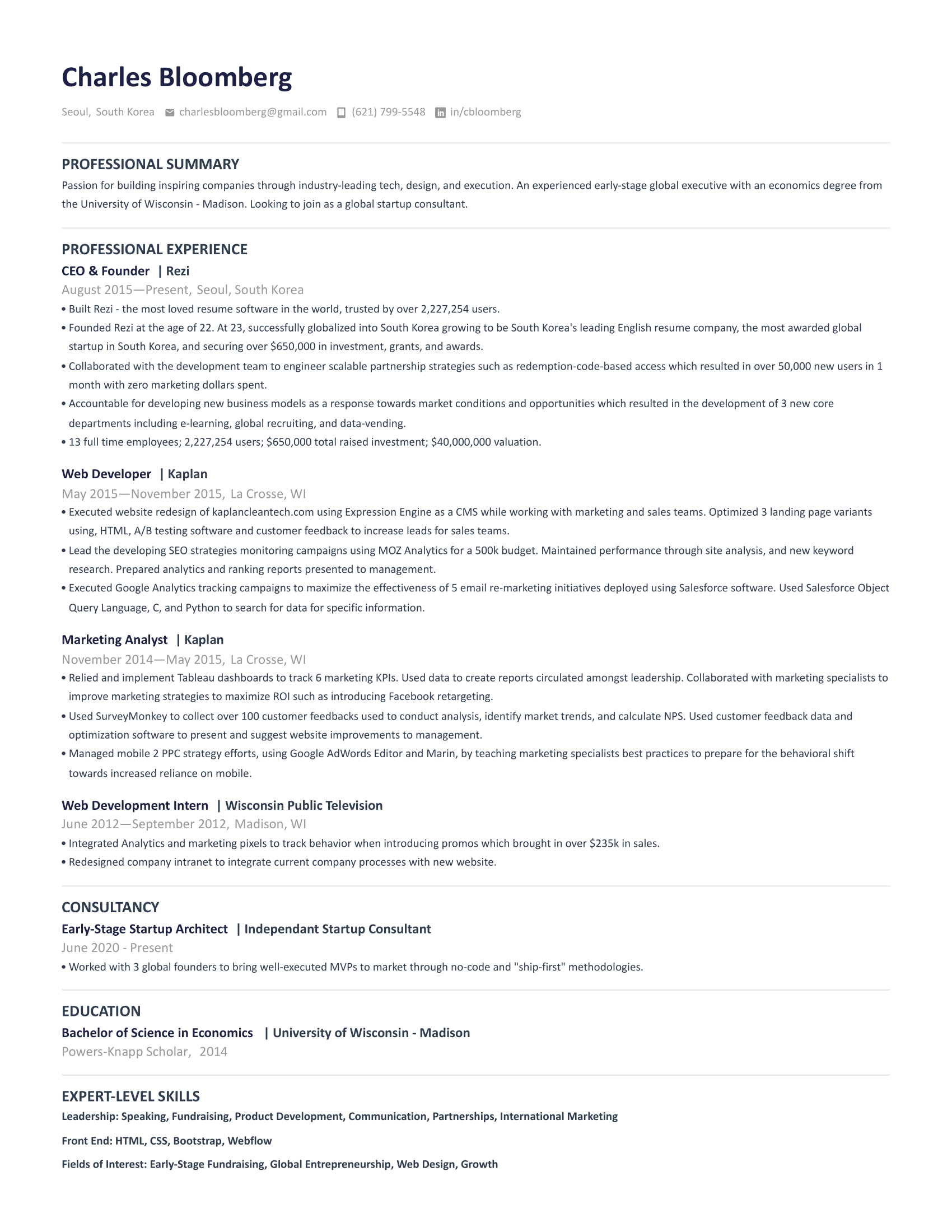
Simple Resume Template
Rezi’s simple resume keeps things straightforward, so employers pay attention to what matters: your qualifications. The template includes clear headings, readable fonts, and section dividers, so you can pack in all your information without overcrowding the page.
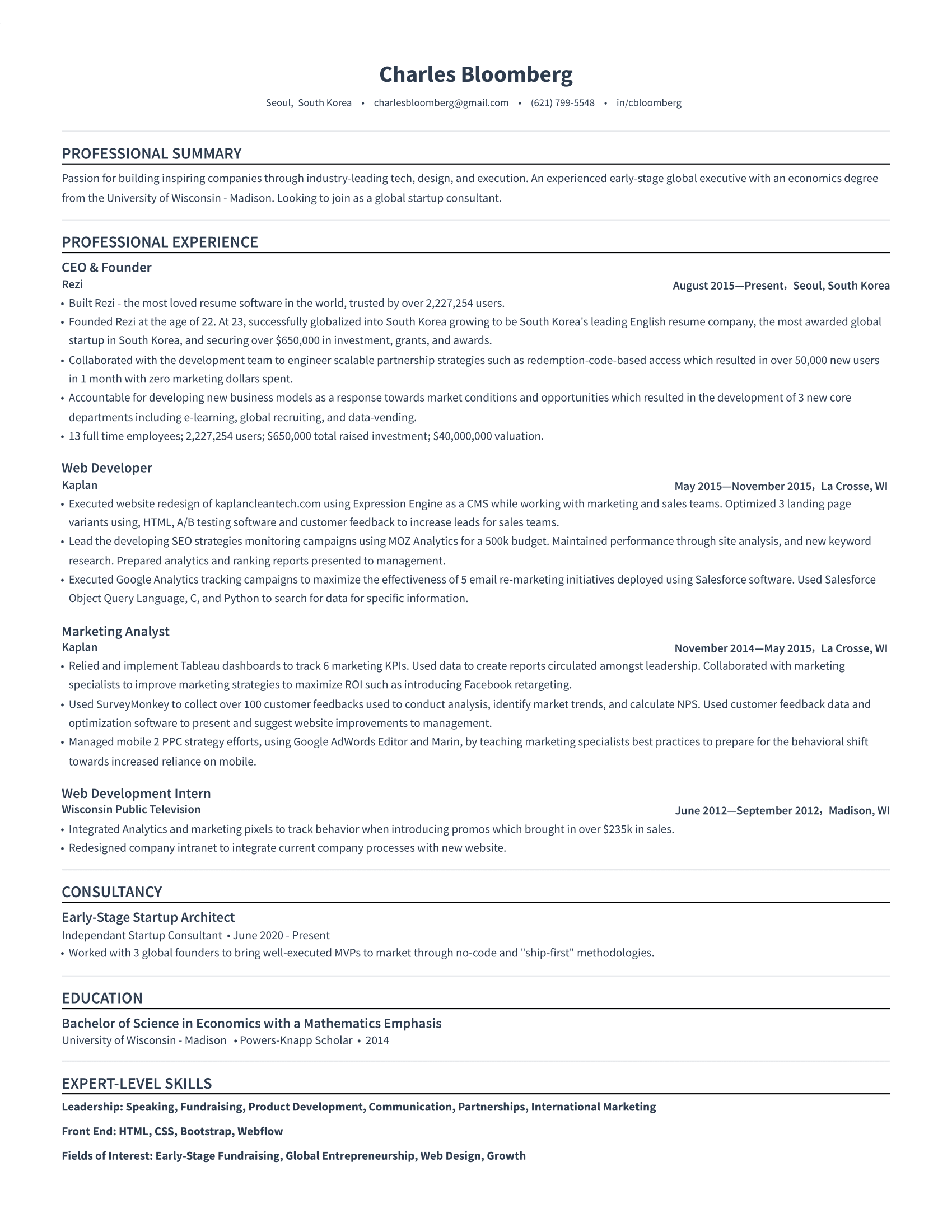
Professional Resume Template
This professional resume proves you can add color to your resume without overdoing it. The blue strip across the top of the template gives it a modern yet corporate feel, while the clear section headings maintain that element of professionalism.
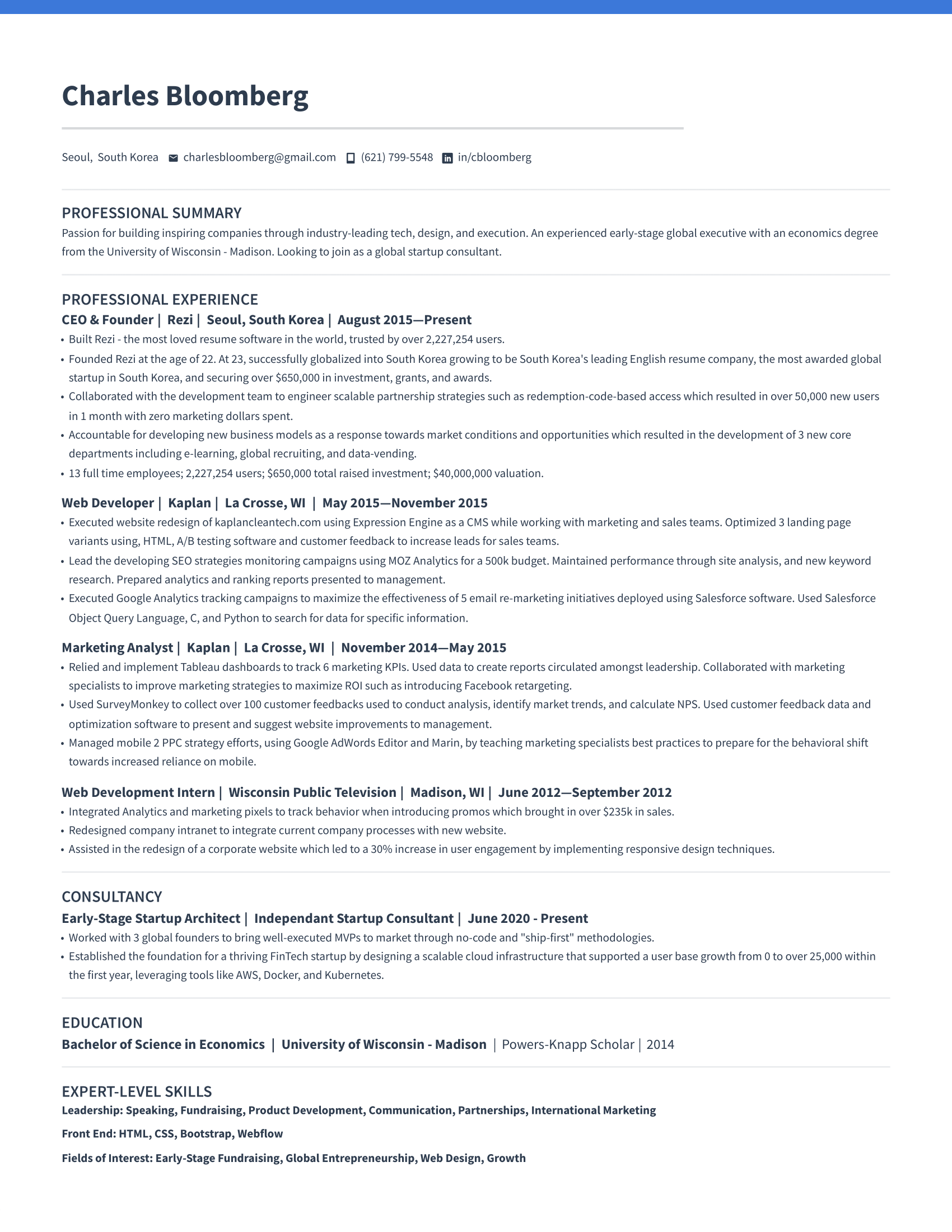
Modern Resume Template
Our modern resume template uses color to help your job titles stand out, instantly giving employers a sense of your work history at just a glance. The use of different font styles also helps to break up the text and make your application more digestible.

Minimalist Resume Template
Rezi’s minimalist resume is designed to help you include all the right details without the page looking like a scrambled mess. This template uses subtle lines and bold headings to divide your text and make it easy to read. The one-column format also helps to maximize space.
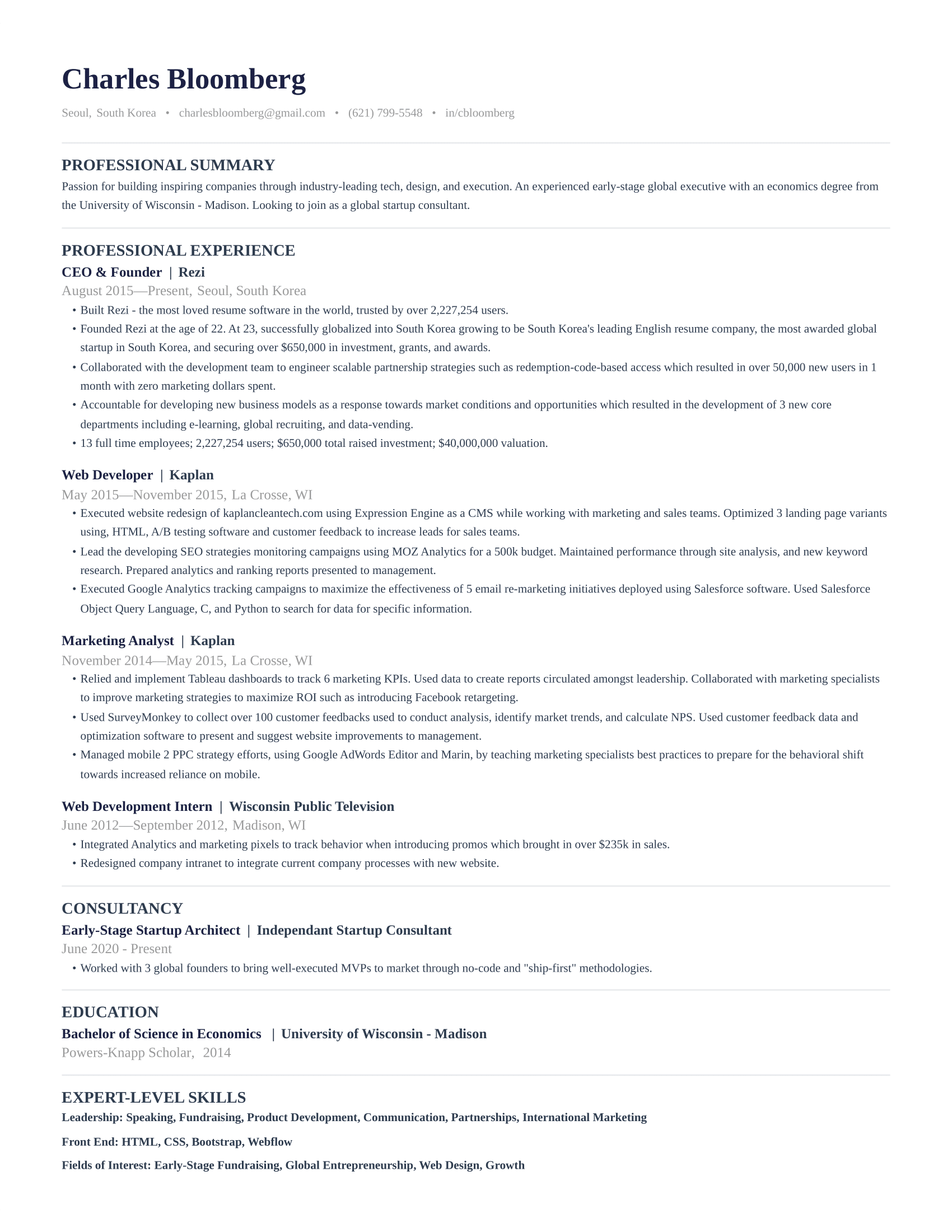
Summary
Here’s a summary covering everything you need to know about editing your resume:
- Regularly add new duties, success stories, and skills while they’re fresh in your mind. It’s much easier to edit in small doses than to reconstruct your career history years later.
- Instead of listing simply job duties, emphasize what you actually accomplished. Use metrics, examples, and outcomes to show the value you brought to the company.
- Tailor your resume to every job by highlighting skills and experiences from the job description to show that you’ve taken the time to understand the role.
- Refresh your skills section so it reflects what’s in demand and remove outdated or irrelevant skills that no longer support the direction of your career.
- Keep your formatting modern and ATS-friendly. Use simple fonts, consistent spacing, and clear headings to ensure your document is readable for both humans and ATS.
- Trim down anything that no longer adds value. As your career progresses, older roles, irrelevant details, and filler statements become less important.
- Swap generic wording for confident, direct statements. Start each bullet with an action verb and include results to make your accomplishments more impactful.
- Proofread thoroughly to avoid distracting errors or inconsistencies. Typos, awkward phrasing, and formatting mistakes can weaken even the strongest experience.
- Check that your resume aligns with the story you want to tell. Over time, your career goals shift, and your resume should evolve with them.
FAQ
How often should you update your resume?
Your resume should be a living document, not something you only touch when job hunting. Ideally, update it every year or whenever you finish a major project, gain a new skill or certification, get a promotion, or switch responsibilities.
Regular updates make it easier to remember accomplishments and keep your achievements current. Waiting years can make the process overwhelming and cause you to forget important contributions. Even small wins, like leading a presentation or completing a course, should be noted, so your resume is always ready for new opportunities.
How to update your resume when changing careers?
Changing careers requires a shift from listing past job duties to highlighting transferable skills and relevant achievements. Focus on what connects your experience to the new industry, like leadership, project management, or communication.
Tailor your resume summary and bullet points to emphasize these skills rather than industry-specific jargon from your old role. You may also want to add online courses, volunteer experience, or certifications that demonstrate your readiness for the new field.
Find out more: How to Write a Career Change Resume
Can ChatGPT rewrite your resume?
Yes, ChatGPT can be a helpful tool for rewriting your resume. You can provide your existing resume or bullet points, and ChatGPT can reword them to highlight achievements, use stronger action verbs, or tailor content for a specific role.
Just keep in mind that ChatGPT is only as good as the prompts you provide. You can suggest strong wording and structure, but you still need to verify facts, numbers, and formatting, and ensure the content reflects your true skills and experiences.
Learn more about using ChatGPT the right way: How to Write a ChatGPT Resume
How to build a resume with no experience?
When you have no experience, focus on skills, education, and accomplishments beyond traditional work history. Include volunteer work, internships, school projects, freelance work, and relevant coursework. Highlight transferable soft skills such as teamwork, communication, and problem-solving.
You can also add resume sections for certifications, online courses, and personal projects to show initiative. Even with limited experience, a well-structured resume tells a story about your potential, dedication, and readiness to learn in a professional environment.
Check out this complete guide for more details: How to Write a Resume With No Experience
Lauren Bedford
Lauren Bedford is a seasoned writer with a track record of helping thousands of readers find practical solutions over the past five years. She's tackled a range of topics, always striving to simplify complex jargon. At Rezi, Lauren aims to craft genuine and actionable content that guides readers in creating standout resumes to land their dream jobs.



